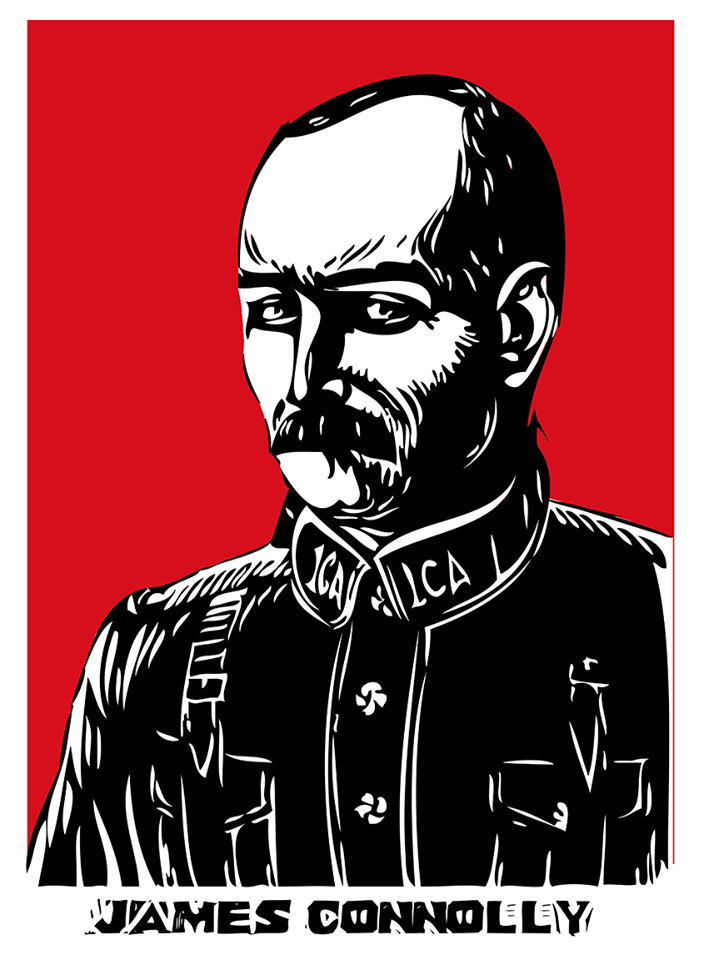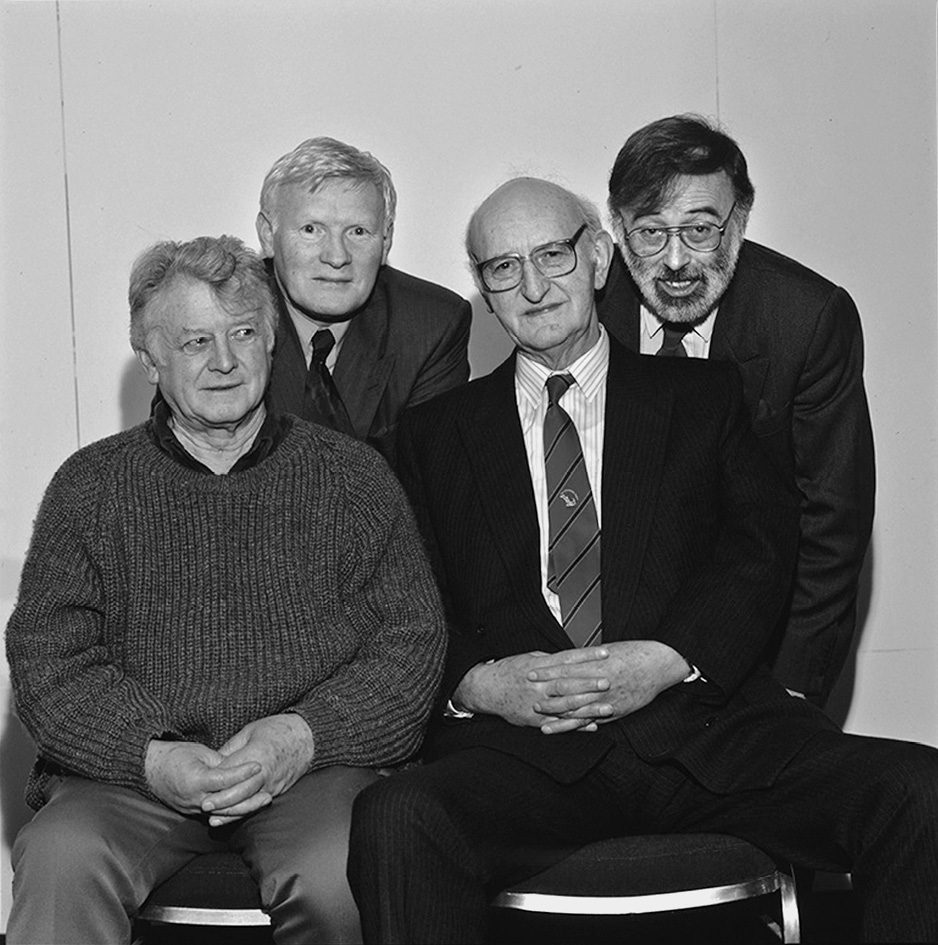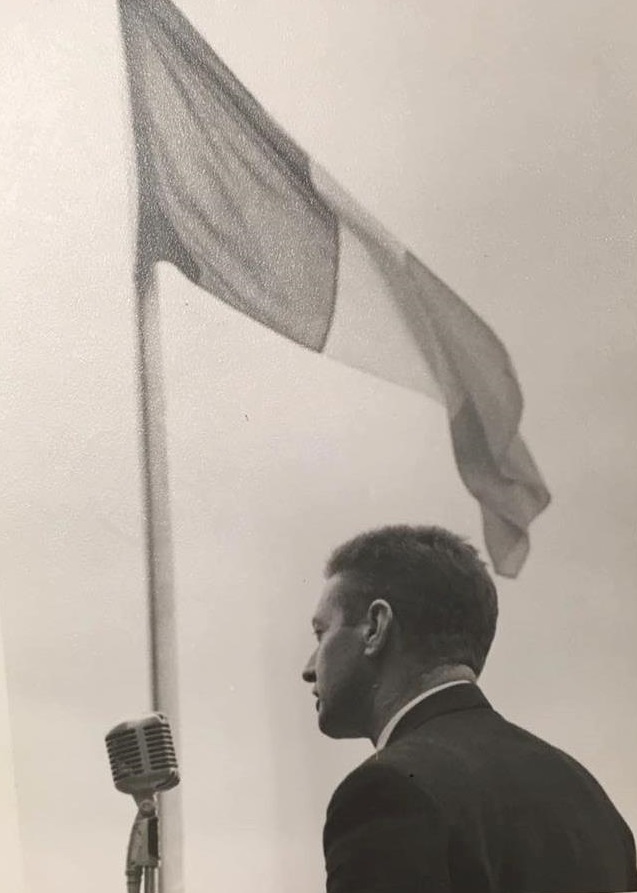Sunday 12th April 2020

Comrades and friends,
This is surely the most surreal Easter commemoration that any of us have ever witnessed or, indeed are likely to witness in the future. The Covid-19 pandemic itself, and the attempts of government to limit and eventually end the spread of this virus, has caused a complete upheaval in the world of work, of education, of shopping, of social interaction and, also, of course, political life. Thus, this year, there are no physical commemorations, no orations, and no post-commemoration socialising.
At this time we hope that our members, supporters, their families, and their communities are safe and healthy. We pay tribute to those workers who are on the frontline of the battle against the coronavirus, especially those in the healthcare and other similar services but also those far from the public eye in the meat plants, in the food processing plants or in food transportation, who are putting their lives at risk for the good of society.
Easter is a time for reflection on the tasks we face and our progress towards them; for remembering with pride those comrades who have gone before us; and for drawing renewed inspiration from the men and women who fought the might of an Empire in the cause of an independent Irish Republic in that famous week in 1916.
But Republicanism is not simply a badge we wear for one day a year, proud as we may be to wear it, nor is it merely a speech to be given at Easter and then forgotten.
It is part of who we are as a revolutionary socialist organisation – it speaks to the struggles of the past, both at home and abroad, and to the best and most advanced of the radical and socialist traditions.

Struggles which inspire us to continue our task in the present day and which we learn from – those of Theobald Wolfe Tone, of James Connolly, of the French Revolution, the Great October Revolution of 1917, the Cuban revolution, the ongoing struggle of the Palestinian people, and indeed the struggles and the sacrifices of our own comrades, north and south, who gave so much to build and to defend our Party and our ideas.
It speaks to the noble ideals of citizenship and equality, to secularism and unity of the people regardless of their religious beliefs or lack thereof, and to the central role of the masses in achieving a better society. What, for instance, was the establishment of NICRA and the struggle for civil rights in the north, in which our Party played such a key role but, in reality, an expression of the true ideals of republicanism – equality of citizenship, democracy, secularism.
Ideals which remain central to our socialist republican ideology. In one of his most important publications, The Concept of Republicanism (1998) Des O’Hagan identified the four essential and component characteristics of republicanism as being “democratic, internationalist, secular and socialist.” (p.5) In that same section Dessie also set out the “critical importance of republicanism for the creation of a truly humane world in the new millennium”.
As Des O’Hagan makes clear in that booklet, to remove true republicanism from the armoury of a party seeking to build a socialist society is to deprive that party of one of its essential building blocks. For our party, such a removal would distort our history, would remove us from our place in the lineage of Ireland’s great revolutionary tradition. Furthermore, such a removal would be to denigrate and forget the sacrifices made by our comrades and the lessons learned on our path to becoming a socialist party.
Republicanism is a foundation stone of our Party and we value deeply its secular, anti-sectarian, and radical traditions and ideals. Again, to quote Des O’Hagan* “There is, therefore, clear-cut political confrontation between republican values, as outlined here, and demonic nationalism and global capitalism.” It is a forward-looking philosophy and tradition, which, in the modern era is best embodied in the ideas of socialist republicanism and the struggle of the mass of working people to win state power through their party. It is a part of who we are and it will remain so.
*The Concept of Republicanism (p. 28).
Of course, our Party, at its best, has never been afraid to move forward, to shed old ideas or approaches that no longer served a purpose and to bring in the new, seeking to be the cutting, radical edge of the working class movement. We were never afraid to admit our mistakes, to rethink our approaches. If we had remained wedded to, and unwilling to reflect on, the failed approach and ideas of nationalism, would we ever have built the revolutionary party? We must never be afraid to reflect, re-evaluate, to ask ourselves if our methods or ideas are up to the task.
Adapting to the changing state of Irish society in the 60s, 70s, and 80s, we brought a fresh approach to the Irish revolutionary tradition in the hope that we could build a party ready for the tasks of the modern era. We also placed our struggle in its true international context.
But, in this sometimes painful transformation, we didn’t abandon, turn our back on, or disdain our roots – we drew on the best and most advanced thinkers, methods, and struggles of our revolutionary republican and working class heritage, to help reshape and develop ourselves as a modern Party for the workers. In doing so, we were always careful to take with us on that journey all of those comrades who could grasp the need for a secular, socialist republic, by bringing together the international and indigenous revolutionary traditions, by patiently educating members, and by seeking to reproduce these ideas in the ranks of the Party.
In the mid-1970s we made it clear that the socialist republic would not be won merely by the adoption of socialist ideas by our organisation but also by the adoption of the Leninist party form – the disciplined, united, democratic organisation of working people tasked with educating, agitating, organising, and leading the masses in the fight for a better world.
In that transformation from militarist conspiracy to workers’ party, we also made it clear that the members own the Party. In this tradition of principled mass politics, we stand not only in the revolutionary practice of Lenin, but in that of Tone and Connolly. Lenin’s Bolshevik Party was made up of tens of thousands of working people, it was an organisation that valued both open debate and party unity – working class collective spirit and discipline in the struggle for socialism. Their victory in constructing a socialist society is one from which we draw inspiration and hope.
Tone and the United Irishmen, were inspired by the actions of the French Revolution and the ideas of ‘the Koran of Belfast’, Tom Paine’s The Rights of Man, to build a mass organisation of tens of thousands of citizens, uniting Protestant, Catholic, and Dissenter. The very embodiment of popular anti-sectarian republicanism which we seek to emulate, the United Irishmen, were smashed by a combination of the local ruling aristocracy, the fomenting of vicious sectarianism backed up by a campaign of brutal and bloody State repression.

And we stand, of course, proudly in the tradition of the great Irish Marxist James Connolly, whose aim in building the Irish Socialist Republican Party, was to bring the struggle for the republic to the masses, and in doing so to end the cult of the purist conspiratorial clique which has so haunted the Irish revolutionary tradition.
In Connolly’s words:
When it was first initiated the word ‘republic’ was looked upon as a word to be only whispered among intimates; the Socialists boldly advised the driving from public life of all who would not openly accept it. The thought of revolution was the exclusive possession of a few remnants of the secret societies of a past generation, and was never mentioned by them except with heads closely together and eyes fearfully glancing around; the Socialists broke through this ridiculous secrecy, and in hundreds of speeches in the most public places of the metropolis, as well as in scores of thousands of pieces of literature scattered through the country, announced their purpose to muster all the forces of labour for a revolutionary reconstruction of society and the incidental destruction of the British Empire.
(Erin’s Hope, 1909)
Learning from Lenin, from Connolly, from Tone, Lalor, and Davitt, this itself was in fact the very task that Cathal Goulding, Tomas Mac Giolla, Sean Garland, and indeed so many others, undertook, starting in 1963 and continued over decades of hard struggle.
Picking up the pieces of a shattered Republican Movement and turning towards the people. Turning away, not just from nationalism and militarism, but from isolation, irrelevance, purism, away from glory and comfort in failure, and towards the hard-headed task of forging a mass revolutionary party; and in doing so hoping to unite all working people in the struggle for socialism; to put state power and the means of production in the hands of the working class; and unashamedly declaring its intention to build a socialist republic.
It was that task of building the revolutionary party for which Billy McMillen, Robert Elliman, Joe McCann, Martin O’Leary and so many more of our comrades who we remember with pride every Easter, made the ultimate sacrifice.

This, of course, remains our task and we will continue the struggle to build the revolutionary party. We know that the best way to honour our comrades is not to retreat into the comfort of isolation but to move forward together, united in our task.
The past few decades have been difficult for socialists, but the tide is now turning. The outcome of the years of austerity and attacks on working people are seen in the growing radicalisation of young people and their openness to socialist ideas. Unable to access affordable housing, education, or decent work, and faced with climate catastrophe and unsustainable environmental degradation, they see, in ever increasing numbers, the vital need for a drastic change in direction and for a socialist alternative. The fruits of neo-liberalism are also, however, seen in the growing threat of the far-right across the world. Class politics is the only means with which to unite working people against the scourge of fascism.
Even in the midst of an unprecedented decade of state-sponsored austerity there have been some notable successes for the modernisation of society. In the South, two ground-breaking referendum victories legalised full marriage equality and laid the basis for legislation providing legal abortion services through our state health system, the HSE. In Northern Ireland years of campaigning eventually led to Westminster approved equalisation of the laws in operation in the rest of the UK to Northern Ireland. From 1983, when our Party had opposed the eighth amendment with the slogan “For Democracy and Tolerance – Vote NO” we can take pride in our role in achieving those victories.
In the general electoral arena there has, undoubtedly, been change but that change does not necessarily equate to progress. In Northern Ireland the sectarian duopoly of Sinn Féin and the DUP continues. The December general election did see a slight chipping away of their complete stranglehold of seats but whether this change is sustainable is very debatable at this stage. In the Republic of Ireland all three of the traditional governing parties, FF, FG, and Labour have suffered major declines. Labour has suffered such a decline in support that many political analysts question its very viability as an ongoing political project.
This decline in the traditional parties in the South has not however resulted in any equal rise of the Left. At February’s general election the two traditional right-wing parties failed, even in combination, to elect enough TDs to form a government. This is unprecedented in 100 years of this state. But the left were not the beneficiaries. The left candidates could only muster eight seats which is exactly the same as the total accrued by the Workers’ Party with seven TDs and independent Tony Gregory in 1989. A desire by the electorate for change and a desire for revolutionary change are two different things.
The December and February elections occurred before the Coronavirus epidemic was seen as a worldwide pandemic. The social, economic, and political crisis brought on by this event will surely mark a sharp change in the politics of our time. In the space of a short few weeks, decades of neo-liberal propaganda and attacks on the state and the working class have been exposed more clearly than ever, not just for their ideological shallowness, but for the profit- and greed-driven expressions of class power that they are.
The years of privatisation and in particular the onslaught of cuts after the 2008 crisis, have left the health services of many countries deeply damaged. North and south the number of hospital beds has been slashed over the last decade by Fianna Fáil and Fine Gael and the Tories. Our nurses forced to strike for pay increases within the last year are now applauded by the very same politicians who forced them to the picket line – the height of establishment hypocrisy.
Marxists have long understood the central role of the working class in society and that role has been brought to the fore over the last few weeks. Healthcare workers, retail workers, cleaners, porters, civil and public servants, factory workers producing ventilators and protective clothing are all at the frontline of the fight, keeping our society functioning.
The gombeen class who leech from working people – the landlords, bankers, and financiers, are nowhere to be seen – have been exposed for the socially useless drain on society that they are. Now is the time to break their grip on the economy – to build universal public housing, to provide quality employment through a green industrial revolution, to invest in our public services, to provide universal public healthcare, to end the degradation of the environment.
When the financial crisis of 2008 struck, many hoped that the time had come when the neo-liberal project could be brought to an end, but the organisations of the working class were either too weak or too subsumed into the politics of compromise to lead the fight. We are now faced with a crisis of even greater scale – socialists and the organised workers’ movement must take the opportunity now to build class power. When this pandemic ends, there will be a bill to be paid, as Taoiseach Leo Varadkar and Chancellor of the Exchequer Rishi Sunak have already told us. Working people must not foot this bill, we must make the rich pay. To do this we must be organised. There will be no change, no real and lasting expression of the power of the working class, without a class party.
Internationally, this crisis has exposed the absolute inability of the European Union to act in a coherent manner in anything other than the implementation of austerity and privatisation, and has yet again brought into question its continued existence. No solidarity has been forthcoming from the EU to aid the working people or the nations of Europe in the fight against the coronavirus. The Italian state has had to rely on the aid and solidarity of the Russian, Chinese, and Cuban states in their battle to control the pandemic in their country.
We salute the achievements of the Cuban people and their revolution. Exporting doctors to help the sick and dying of countries around the world, yet daily faced with the consequences of the appalling US embargo, their example shows the progress that a society built in the interests of all of its people can make.
Indeed, not satisfied with being responsible through its regime of economic sanctions for the deaths of thousands of people around the world – from Iran, to Venezuela, to Cuba – the US Empire’s response closer to home will condemn to an unnecessary death, thousands upon thousands of its own citizens. This comes as no surprise to anyone who knows the history of the US, but the braindead response of the Trump administration to the coronavirus brings to a new level the bankrupt ideology and mentality of the US ruling class. The US is an empire in decline, and let us wish it as speedy a decline as we can, in the hope that a better world might then be able to rise without having the life squeezed out of it by the CIA and the State Department in the name of ‘freedom and democracy’.
2020 marks the 50th anniversary of the Falls Curfew. We remember the brave men and women of the Official Republican Movement who stood strong against British imperialism. Those same men and women over the following decades refused to go down the path of sectarian war, staying loyal to the principles of the Republican Movement throughout, and dedicating themselves to building the party to unite the working class.
Finally, January this year marked the 50th anniversary of the 1970 Sinn Féin Ard Fheis. The course of history and the strength of our anti-sectarian socialist ideas show us that we were right then, and we should be confident that our ideas are still right. But at times like this, we must remember that we cannot content ourselves with being right if we do not have the support of the masses.

Comfort in the certainty of political purity would not satisfy Cathal Goulding, nor any of the men and women who stayed true to republican principles in 1970 and who sought to build a revolutionary party in the spirit of Connolly.
As they understood, the combination of class politics and the mass party is the only path to victory, the only path to the socialist republic – if either ingredient is missing then failure is guaranteed. They did not fight simply so they could say they were right, they fought to win. To do them justice, we must do the same.
The Workers’ Party is growing in strength and numbers again – but we must do better – a mass workers’ party will not be built on abstract sloganeering, nor self-congratulation about past victories.
It will be built on hard work, class politics, openness to debating ideas and to bringing working people towards us and with us, and a willingness to reflect on and appraise our achievements and our failures.
This, then, is not a time to pay mere lip service to James Connolly, to the men and women of the Irish Citizen Army, or to Cathal Goulding and Billy McMillen, but a time for all of us to affirm in a real way our commitment to the aims they fought for.
Those of us who do so will remain inspired by their commitment to their cause – our cause, and, from their unwillingness to bend or break in the face of Empire, the US dollar, or the capitalist enemy, we will draw the strength we need to continue on the path towards our goals – to unite Protestant, Catholic, and Dissenter, to break the connection with capitalism, and to establish an independent and unitary socialist republic on the island of Ireland.
